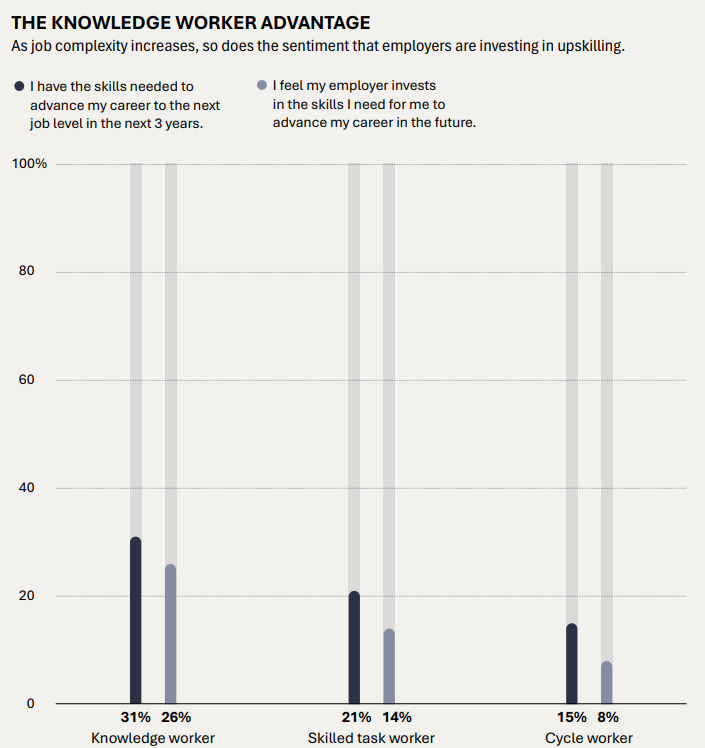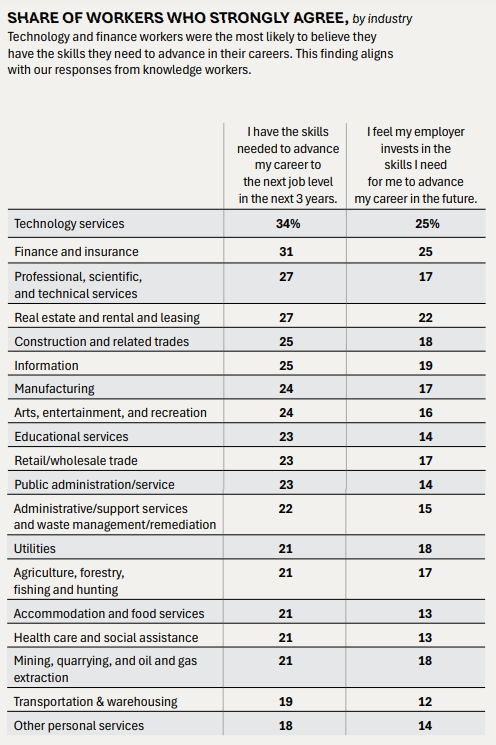
'If companies want to benefit from the enormous technological advancement to come, they must start with investing in the skills and career progression of their workers'

As generative artificial intelligence (GenAI) continues to change the way of doing work, there is a strong need for employers to provide training for their workers, according to a recent report.
Currently, only a quarter (24%) of the global workforce is confident they have the skills needed to advance to the next job level in the near future, and just 17% of workers strongly agree their employers are investing in the skills they need for career advancement, finds ADP
The numbers are low among knowledge workers even though they are above the average. However, the numbers are even lower among skilled workers and cycle workers – those that do similar repetitive tasks daily.

Only 3.8% of workers learn new skills on the job within two years of employment.
In November 2024, 29.2% of persons aged 25 to 54 had taken training outside the regular education system in the previous 12 months, down 0.8 percentage points compared with November 2022, according to Statistics Canada (StatCan).
By industry, technology and finance workers are the most likely to believe they have the skills they need to advance in their careers. This finding aligns with the responses from knowledge workers.

“Colleges and vocational schools prepare young adults to enter the job market. But the learning process can’t stop there,” reads part of ADP’s People at Work 2025: A Global Workforce View.
“With rapid-fire advances in technology bearing down on employers and their workers, on-the-job training and continuing education have become just as important as post-secondary schooling, if not more so. Even workers with advanced college degrees might need to bolster their on-the-job skills.”
Also, among workers who feel strongly that their employers are investing in their skills development, 54% had received a recent promotion. The promotion rate falls to 34% among workers who feel let down by their employers’ upskilling opportunities.
Business strategy and management skills are among the most popular skills demanded by professionals as they seek to grow in their careers, according to a previous report from Udemy.
What is the benefit of giving training?
When employers provide workers with training, workers are 3.3 times s more likely to describe themselves as highly productive, according to ADP's survey of 38,000 working adults across 34 markets, conducted July 23 and Aug. 6, 2024.
And workers who feel strongly that their employer is providing the training they need are nearly 6 times more likely than others to recommend their company as a great place to work.
There’s also a better retention among employers that provide workers with training compared with those that don’t.

"Our research shows that a skilled workforce is more loyal to their employers – and more productive. Yet only a small fraction of workers are upskilled within two years of being hired," says Nela Richardson, chief economist, ADP. "If companies want to benefit from the enormous technological advancement to come, they must start with investing in the skills and career progression of their workers."
Here’s how to upskill workers effectively, according to another expert.